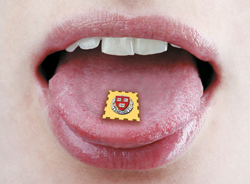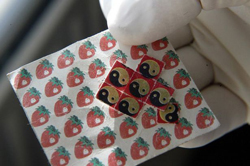By Kelly Patricia O’Meara
March 3, 2014
The mental health bobble heads are at it again. As if the already hundreds of legal psychiatric mind-altering drugs on the market aren’t causing enough damage, researchers have recently begun to champion the possible therapeutic use of LSD and other hallucinogens in mental health.
Last year, Norwegian researchers Teri Krebs and Palorjan Johansen, announced that, based on analysis of information from a 2001-2004 National Survey on Drug Use and Health in the United States, there were “no significant associations between lifetime use of any psychedelics, lifetime use of specific psychedelics (LSD, psilocybin, mescaline, peyote), or past year use of LSD and increased rate of any of the mental health outcomes,” and instead they found that “in several cases psychedelic use was associated with lower rate of mental health problems.”
The implication, of course, is that perhaps hallucinogens, like LSD, and dissociative drugs, like PCP, may be of some use in treating mental illness.
Given that, according to IMS Health, over 77 million American minds (one in four) already are chemically altered with prescription psychiatric drugs, one cannot help but wonder whether dredging up and repackaging the dangerous recreational drugs of the 1960’s is such a groovy idea.
The researchers acknowledge that because of the design of the study they aren’t sure why they found these results. But they also acknowledged that, “We cannot exclude the possibility that use of psychedelics might have a negative effect on mental health for some individuals or groups, perhaps counterbalanced at a population level by a positive effect on mental health in others.” Hallucinogens having a “positive effect” on mental health?
Can’t help but think this sounds eerily similar to the marketing of the current mind-altering psychiatric drugs: “may cause suicidal ideation” to a percentage of the population. It’s the old some-may-live-and-some-may-not theory of psychiatric drug “therapy”—a kind of mental health collateral damage.
Johansen admitted that, “Everything has some potential for negative effects, but psychedelic use is overall considered to pose a very low risk to the individual and to society,” and “Psychedelics can elicit temporary feelings of anxiety and confusion, but accidents leading to serious injury are extremely rare.” That’s great information unless it’s you, or a loved-one, that experiences the hallucinogenic “accident.”

The DEA considers LSD a Schedule I drug, which has “no currently accepted medical use and a high potential for abuse.”
Of course the Drug Enforcement Administration (DEA) is far less complimentary about the uses of hallucinogens. According to the nation’s top cops on drugs, LSD and Peyote are considered Schedule I drugs, which “have no currently accepted medical use and a high potential for abuse. Schedule I drugs are the most dangerous drugs of all the drug schedules with potentially severe psychological or physical dependence.”
More than that, though, the promising implications of the Norwegian study also won’t be getting any love from the National Institute on Drug Abuse (NIDA), which makes it clear that hallucinogens, like LSD, cause “profound distortions in a person’s perceptions of reality.”
NIDA further explains that, “When under the influence of either type of drug (LSD or PCP), people often report experiencing rapid, intense emotional swings and seeing images, hearing sounds, and feeling sensations that seem real but are not.”
And according to NIDA, “These drugs can disrupt a person’s ability to think and communicate rationally, or even to recognize reality, sometimes resulting in bizarre or dangerous behavior.”
Harvard-trained psychiatrist and author of Psychiatric Drug Withdrawal: A Guide for Prescribers, Therapists, Patients and Their Families, Dr. Peter Breggin well remembers the past and understands the dangerous effects of LSD use.
“Having lived thru the 1960’s,” said Dr. Breggin, “and witnessed directly the effects of LSD and other hallucinogens on essentially normal people, there is no doubt this causes psychotic breaks often leading to prolonged emotional disturbance. The use of this in so-called treatment is not new, but was discarded decades ago because of repeated disasters.”
Hallucinogens alone are dangerous enough but couple the above information with the known possible side effects of today’s antidepressants, such as agitation, aggressiveness, hyperactivity, confusion, increased blood pressure and seizures, and suddenly the “therapeutic” implications of hallucinogens becomes extremely frightening.
Perhaps more importantly, given psychiatry’s unbridled affinity for prescribing cocktails of mind-altering drugs to “treat” mental disorders, is it wrong to doubt that the mental health industry could resist adding hallucinogens to the already over-prescribed antidepressant/antipsychotic cocktails?
Anyone remotely familiar with the current trend in psychiatric drug “therapy” would agree that the chances of psychiatrists showing any restraint is as likely as shag carpeting making a comeback. Bad ideas don’t get better with time.
—
Kelly Patricia O’Meara is an award-winning former investigative reporter for the Washington Times’ Insight Magazine, penning dozens of articles exposing the fraud of psychiatric diagnosis and the dangers of the psychiatric drugs—including her ground-breaking 1999 cover story, “Guns & Doses,” exposing the link between psychiatric drugs and acts of senseless violence. She is also the author of the highly acclaimed book, Psyched Out: How Psychiatry Sells Mental Illness and Pushes Pills that Kill. Prior to working as an investigative journalist, O’Meara spent sixteen years on Capitol Hill as a congressional staffer to four Members of Congress. She holds a B.S. in Political Science from the University of Maryland.



SHARE YOUR STORY/COMMENT